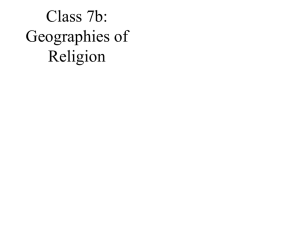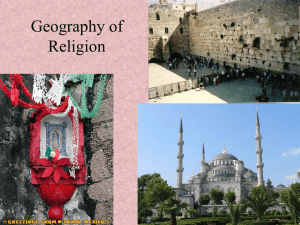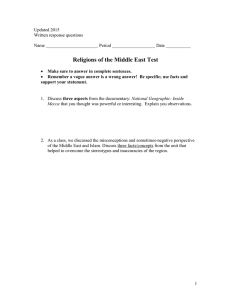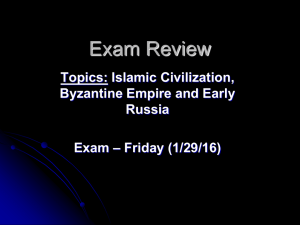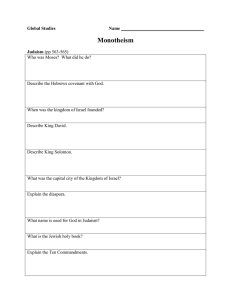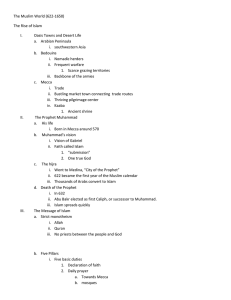class7b.ppt
advertisement
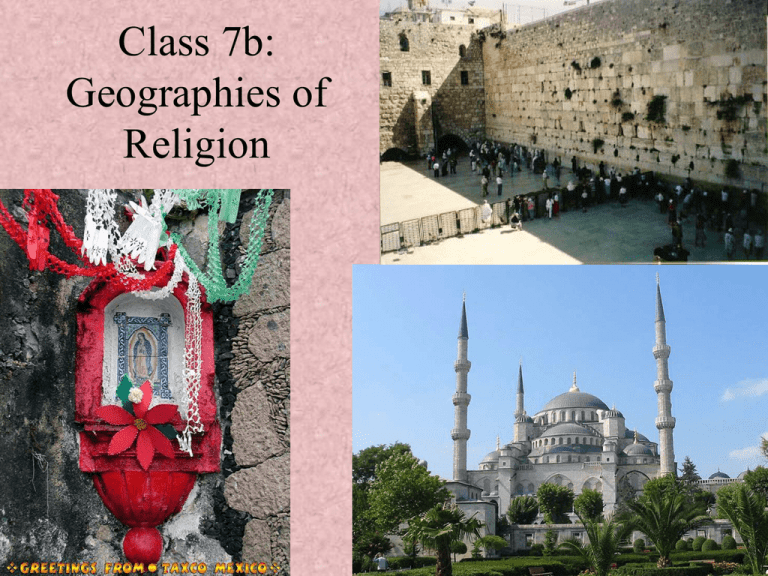
Class 7b: Geographies of Religion Religion and culture • Everyone has values and morals • Religion means worship, faith in the sacred or divine • Mentifacts: individuals’ beliefs • Sociofacts: relationships based on those beliefs Religion and geography • • • • Spatial distribution of religions Diffusion of religious beliefs and practices Impact on the landscape Territorial conflicts over religion • Figure 7.25 Distribution of religions • Universalizing religions – Christianity, Islam, Buddhism • Ethnic religions – More than a statement of faith – Judaism, Hinduism, Shinto • Tribal or traditional religions – Animism, shamanism Distribution of Christianity • Largest religion (2 billion) • Three major branches – Roman Catholic 50% – Protestant 25% – Eastern Orthodox 10% • Others: Pentecostal, Mormon, Armenian, Coptic, Maronites • Figure 7.25 Diffusion of Christianity • Began in Jerusalem • Official religion of Rome by 313 • Split Roman Empire and Christian church – Roman Catholicism in West – Eastern Orthodox in East • Protestant Reformation second split – Catholicism in South – Protestantism in North • Figure 7.29 Diffusion of Christianity • Spread to New World by colonizers, settlers Figure 7.31 Christianity and the landscape • Church as center of settlement – Collective worship important – Architecture, layout symbolic • Cemeteries as land use • Hierarchy of spatial organization Vermont Paris Sacramento Christianity and territory: Ireland • • • • English colony Independence in 1937 6 counties voted to stay North discriminated against Catholics • IRA: terrorism for unity • 1966-1999: 3000 dead Distribution of Islam • Fastest growing religion (1.2 billion) • Two major branches – Sunni 85% – Shiite 15% • North Africa, SW Asia, Indonesia • Figure 7.25 Five pillars of Islam • There is no God but God, and Muhammad is his prophet • Pray 5 times daily, facing Mecca • Give to charity • Fast daily during Ramadan • Pilgrimage to Mecca at least once (hajj) Other practices of Islam • Qur’an or Koran: sacred text – Revealed to Muhammad – Should be read in Arabic • Hadith: sayings and actions of Muhammad – “Chain of reporters” – Open to interpretation (e.g., veiling) Other beliefs of Islam • Tolerance of People of the Book – Jews, Christians – Descendants of Ishmael • More egalitarian than Christianity – No intermediaries – Worshippers are equals Diffusion of Islam • Began in Mecca and Medina in 622 • Spread rapidly to east and west • Conquered North Africa, Spain, SE Europe within 200 years • Traders spread to SE Asia, Africa Diffusion of Islam • Split over succession – Shiites insist on hereditary leaders – Sunnis do not • Iran, Bahrain, southern Iraq: Shiite • Iraq civil war? Islam and the landscape • Sacred cities: Mecca, Medina, Jerusalem – Muhammad’s birthplace, Ka’ba – Muhammad’s first “conquest” – Muhammad’s ascent to Heaven • Mosques for community gathering, worship – Mihrab points to Mecca – Minaret: tower for call to prayer Turkey Burkina Faso Uzbekistan Cordoba Granada Islam and territory: Spain • Reached France and Vienna; driven back • Ruled much of Spain for 300 years • Driven out by 1492 • Forced conversion sent Muslims, Jews east 1030 1360 arroz (rice) azúcar (sugar) limón (lemon) naranja (orange) ajedrez (chess) almohada (pillow) embarazo (pregnancy) alcabala (tax) alcalde (mayor) barrio (neighborhood) alcohol algebra Religion and fundamentalism • • • • Ultraconservative beliefs Reaction to modernism Want to institutionalize their values Them against the world
